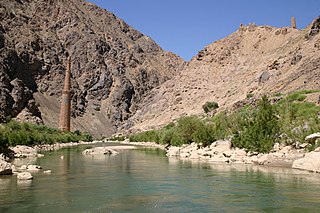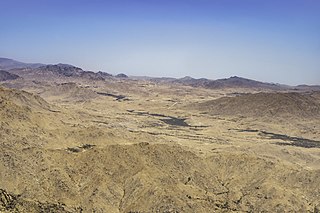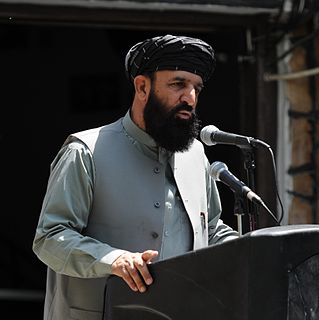Related Research Articles

Ghazni, historically known as Ghaznin (غزنين) or Ghazna (غزنه), is a city in central Afghanistan with a population of around 270,000 people. The city is strategically located along Highway 1, which has served as the main road between Kabul and Kandahar for thousands of years. Situated on a plateau at 2,219 metres (7,280 ft) above sea level, the city is 150 km south of Kabul and is the capital of Ghazni Province.

Ghazni is one of the 34 provinces of Afghanistan, located in eastern Afghanistan. The province contains 19 districts, encompassing over a thousand villages and roughly 1.3 million people, making it the 5th most populous province. The city of Ghazni serves as the capital. It lies on the important Kabul–Kandahar Highway, and has historically functioned as an important trade center. The Ghazni Airport is located next to the city of Ghazni and provides limited domestic flights to Afghanistan's capital, Kabul.

Ghōr, also spelled Ghowr or Ghur, is one of the thirty-four provinces of Afghanistan. It is located in Hazarajat region in central Afghanistan, towards the north-west. The province contains eleven districts, encompassing hundreds of villages, and approximately 657,200 settled people. Firuzkoh, serves as the capital of the province. In the same province Mahmud of Ghazni and Mohammad ghori [during the East India company times The Lucknow people called the British army ghori (reference)] were born here
Abu Mansur Nasir al-Din Sabuktigin, also spelled as Sabuktagin, Sabuktakin, Sebüktegin and Sebük Tigin, was the founder of the Ghaznavid dynasty, ruling from 367 A.H/977 A.D to 387 A.H/997A.D. In Turkic the name means beloved prince.

Zabulistan, was a historical region in southern Afghanistan roughly corresponding to the modern provinces of Zabul and Ghazni.

Jaghori is one of the main districts of the Ghazni province in Afghanistan. It is located in the highlands in the southern fringes of the Hazaristan region. It occupies 1,855 km2. in the upper Arghandab valley. The population is estimated to be around 560,000 in 2015. The district capital, Sange-e-Masha, is where major business transactions take place. The district is heavily dependent on agriculture, and migrant workers as the main sources of income. Other major marketplaces are in Ghojor, Hotqol and Anguri.

Malistan is a district in the west of Ghazni Province, Afghanistan. Its population, which is 100% Hazara, was estimated at 350,000 in 2009. The district capital is Mir Adina.
Hajii Sher Alam Ibrahimi was the governor of Ghazni Province from around 2005–2006 until 2007 and is a major commander aligned with Ittihad-i Islami and Abdul Rasul Sayyaf, having fought with him in the Afghan Civil War.

Asadullah Khalid is a politician in Afghanistan. He served as head of the National Directorate of Security (NDS), which is the domestic intelligence agency of Afghanistan. Before his appointment as the head of the NDS in September 2012, Khalid served as the Minister of Tribal and Border Affairs. Between 2005 and 2008, he was the Governor of Kandahar Province and prior to that as Governor of Ghazni Province (2002-2005). Khalid is said to be affiliated with the Islamic Dawah Organisation of Afghanistan and has been noted as one of many loyalists of Afghan President Hamid Karzai.
Mohammad Amam Hamimi is a former Governor of Logar Province in Afghanistan. He was governor from 10 March 2004 to December 2005. He was succeeded by Abdul Karim Matin as Ghazni governor in 2016.

Qarabagh, is a district 56 km to the south-west of Ghazni in eastern Afghanistan. The 1,800 km2 area is one of the most populated at 109,000; some reports count more than 218,000. The ethnic composition of the district includes Hazaras and Pashtuns. The landscape varies in different parts of the district - deserts in the southwest, plains in the southeast and mountains in the north. The district is seriously affected by drought, especially farming and animal husbandry. Health and education need serious improvement.

Zana Khan district is a mountainous district in Ghazni Province, Afghanistan with more than 12,000 people living there. The district center is Dado.

Khwaja Umari is a district in Ghazni Province, Afghanistan. It was created in 2005 from the large Jaghatu District. The population in 2005 was estimated at 16,100, of whom 20% were Pashtun, 35% Tajik and 45% Hazara. The district center is the village of Khwaja Umari.

The 2007 South Korean hostage crisis in Afghanistan began on 19 July 2007, when 23 South Korean missionaries were captured and held hostage by members of the Taliban while passing through Ghazni Province of Afghanistan. Two male hostages were executed before the deal was reached between the Taliban and the South Korean government. The group, composed of sixteen women and seven men, was captured while traveling from Kandahar to Kabul by bus on a mission sponsored by the Saemmul Presbyterian Church. The crisis began when two local men, who the driver had allowed to board, started shooting to bring the bus to a halt. Over the next month, the hostages were kept in cellars and farmhouses and regularly moved in groups of three to four.
Mohammad Gulab Mangal is an Afghan politician. Since October 2016, he has been serving as the senior adviser minister of borders and tribal affairs for the president of the Islamic Republic of Afghanistan. He is also actively involved in the tribal conflict resolutions. On 23rd October 2016, he was appointed as the senior adviser for the minister of borders, tribal affairs, and provincial governor of Nangarhar province until he resigned in April 2018. From 22nd April 2015 to 23rd October 2016, based on the presidential decree, he was appointed as the acting minister of Ministry of Borders and Tribal Affairs. In 2002, he was elected as the Representative of Paktia Province for Emergency Loya Jirga. From 2002 to 2004, he was the Head of Constitution office for the south east region(Paktia, Paktika, Khost and Ghazni provinces and also Head of Constitution Loya Jirga election office for the South East Region. From 2004 to 2006, he served as Governor of Paktika province. From 2006 to 2008, he served as the Governor of Laghman province. From March 2008 to September 2012, he served as provincial governor of Helmand province.
Osman Osmani was appointed as the governor of Ghazni Province, Afghanistan in June 2008. He was succeeded by Musa Khan Ahmadzai in 2010. He was governor when Aafia Siddiqui was arrested outside his compound in Ghazni on July 17, 2008.

General Musa Khan Akbarzada is a politician in Afghanistan, serving as the governor of Ghazni province from 2010 to 2015. He is an ethnic Pashtun from the Ahmadzai tribe. His former careers include consulate general in Peshawar, Pakistan, during the government of Burhanuddin Rabbani in early 1990s. Prior to that he was a commander for Abdul Rasul Sayyaf and before that he was a general in the Afghan National Army, during the time of the Daud Khan administration in the 1970s.
Abdul Karim Matin is an ethnic Pashtun politician who served as the governor of Paktika Province from 2014 to 2015, and of Ghazni since 2016. Matin went to Gazi High School and studied at Kabul University. He was a Ministry of Rural Rehabilitation and Development official for Urban Rainwater Harvesting and the Regional Coordinator for Southern Region of Afghanistan. In 2015, Mateen has escaped unharmed from an armed attack from Taliban when he was visiting security check posts in the outskirts of Sharana.

The Ghazni offensive began on 10 August 2018, when Taliban fighters launched an assault on the city of Ghazni, Afghanistan's sixth largest city and one which has been culturally and strategically important for much of the country's history. The attack resulted in the deaths of hundreds of insurgents, soldiers, police, and civilians. The city also sustained large-scale property damage. The battle, occurring only weeks before Afghanistan's 2018 parliamentary election, was the largest since a three-day truce in June had raised hopes of peace talks.
References
- ↑ Straziuso, Jason (16 October 2007). "Roads near Kabul grow dangerous". USA Today. Associated Press. Retrieved 12 July 2015.
- ↑ Sajad (24 August 2012). "Former governor for Ghazni province injured in militant attack". Khaama Press . Retrieved 12 July 2015.
| | This article about an Afghan politician is a stub. You can help Wikipedia by expanding it. |